Finally, a momentous milestone in financial literacy education has been reached: half of all U.S. states have passed legislation requiring graduating high school students to complete a one-semester standalone Personal Financial Literacy (PFL) class. Pennsylvania has become the 25th state to reach the “gold standard” of K-12 financial literacy education. More important than reaching half of the U.S. state total (25 out of 50) is the number of students reached – Next Gen Personal Finance estimates that the Keystone State’s new law puts 53 percent of our nation’s high school students into standalone PFL classes. The fact that Pennsylvania is the fifth most populous state helps explain why most teens will now get the gold standard of financial literacy education.
The standalone PFL requirement will begin with the high school class of 2027, meaning this year’s 9th grade freshmen. Champions of the movement to get Pennsylvania to gold standard status include state senator Chris Gebhard (R-48) and state Auditor General Timothy L. DeFoor. Governor Josh Shapiro, a proponent of financial literacy and public education himself, signed the bill into law. Gebhard had been pushing this proposal more than a year ago, so much praise is deserved for helping get it across the governor’s desk!
PFL “Gold Standard” Bill Got Absorbed Into Larger Bill
Gebhard managed to get his proposal across the finish line with Senate Bill 647, which amended an existing law about public education (Act No. 14 of 1949). Gebhard’s proposal for a standalone PFL class for high school graduation was added to other proposed amendments and incorporated into an omnibus bill. An omnibus bill is a large bill that incorporates several smaller bills with similar topics and goals. These bills may be easier to pass, as they can contain multiple provisions that appeal to many different legislators across the state or country. Linking a mandatory PFL class proposal with other popular proposals can increase its chances of success.
Pennsylvania is well-positioned to implement Gebhard’s proposal, as its Department of Education has had a task force studying financial literacy education since 2010. Nonprofits like the Pennsylvania Council on Financial Literacy are tremendous assets in helping educators get prepared to teach the new course. The PA Bankers Association also provides free educational resources, as does the state Department of Banking and Securities.
After One More State, Those Without Mandatory PFL Classes Will be in the Minority
Hitting number 25 is an important achievement and may even achieve “critical mass” to make K-12 financial literacy education a nationwide requirement. Half of all U.S. states are now gold standard financial educators, meaning one more state to join the roster will put those that do not require a standalone PFL class for high school graduation in the minority. This will provide ample positive “peer pressure” to join the gold standard club. No state will want to be seen as less educationally rigorous than its neighbors.
Which state will be the next to pass a gold standard financial education law? Hopefully, it will be very soon!


